|
|
|
Sort Order |
|
|
|
Items / Page
|
|
|
|
|
|
|
| Srl | Item |
| 1 |
ID:
189965
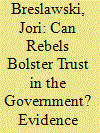

|
|
|
|
|
| Summary/Abstract |
Commitment problems make civil wars difficult to end. Research on overcoming commitment problems focuses on warring parties, however civilians’ perceptions are central to successful transitions from war to peace. While civilians residing in areas previously controlled by armed groups may be highly distrustful that governments will implement peace agreements, I argue that some armed groups are both motivated and capable of improving trust in the state. Using survey data from civilians in the Bangsamoro, Philippines, I show that civilians that experienced rebel security provision or rebel justice provision from the MILF are more likely to trust that the Government of the Philippines will fully implement the peace agreement than civilians that did not experience rebel governance provision.
|
|
|
|
|
|
|
|
|
|
|
|
|
|
|
|
| 2 |
ID:
185186
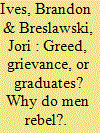

|
|
|
|
|
| Summary/Abstract |
Education is widely known for its positive effect on conventional politics and nonviolent protest as well as its suppressive effect on violence. However, recent studies have connected education to violence through its effect on relative deprivation and frustration–aggression mechanisms. We address these divergent findings by presenting a theory of the conditional effect that education has on violence. To do so, we build on literature addressing education’s positive association with political participation, such as voting and protests, and question how this relationship translates to contexts in which conventional and nonviolent channels are unlikely to be effective – specifically, in cases of politically excluded ethnic groups. We argue that education increases ethnic group members’ resources and desire to address grievances. Yet, because the ethnic group is politically excluded, opportunities for conventional politics and nonviolent protest are limited. Educated ethnic group members are limited in political options, and are thus more likely to address their grievances through the support of rebel groups, increasing the probability of violence. Violence then occurs in localities where members of a politically excluded ethnic group are located and where those members have higher levels of education. Using geo-spatial data and statistical analysis, we demonstrate that education has divergent effects on violence in areas populated by politically excluded versus politically included ethnic groups in Africa and Central America. Areas with highly educated politically excluded ethnic group members are the most likely to experience violent events.
|
|
|
|
|
|
|
|
|
|
|
|
|
|
|
|
| 3 |
ID:
178900
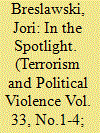

|
|
|
|
|
| Summary/Abstract |
Why do some militant groups use rhetoric that indicates intentions of democratic governance, while others are silent on these issues, or even clearly oppose them? In this article, I explore militant groups’ desire for external legitimacy, and seek to explain when they are willing to make costly promises to follow liberal norms. I argue that human rights media attention has a significant effect on group behavior. Specifically, militant groups are more likely to use democratic rhetoric when they are “in the spotlight,” which results in a higher likelihood of external legitimacy in exchange for following costly liberal norms. Using the Minorities at Risk Organizational Behavior (MAROB) data for the Middle East, Eastern Europe, and Russia, as well as a historical analysis of three militant groups in Indonesia, I find that militant groups residing in areas that receive a large amount of media attention are more likely to support democratic practices.
|
|
|
|
|
|
|
|
|
|
|
|
|
|
|
|
| 4 |
ID:
178899
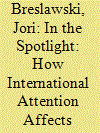

|
|
|
| 5 |
ID:
164166
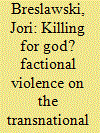

|
|
|
|
|
| Summary/Abstract |
Why are some factions fighting for greater national self-determination (SD) more violent than others? While previous explanations of violence in these disputes have focused on the number of factions, their internal structures, and power distributions among factions, we find many factions that do not follow the expectations of these theories. In this article, we center on religious ideology, its unique transnational character, and the opportunity it creates for political elites from competing factions within the same SD movement to mobilize support. We argue that “religious factions” have a greater incentive to use violence than other factions. Violence serves as a costly signal, and it can be used to demonstrate a faction’s religious credentials to transnational networks and contacts, as they compete with each other on the international stage for the same potential benefactors. We code original data on the religious ideology of factions. We find that an increasing number of religious factions is associated with increased religious faction use of violence. Furthermore, our findings point to a critical insight: it is not religious ideology, but competition between religious factions, that generates violence.
|
|
|
|
|
|
|
|
|
|
|
|
|
|
|
|
| 6 |
ID:
177026
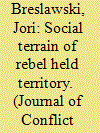

|
|
|
|
|
| Summary/Abstract |
The extent of local order varies widely in rebel held areas, from total chaos to well-run governing institutions. When these institutions exist, why do some include civilian input in local affairs, while others exclude civilians from governance? I argue that rebels choose different governing strategies that maximize their utility of territorial control, based on certain characteristics of civilian inhabitants populating the territory. Rebels’ constituency determines whether rebels seek to govern civilians or control them solely with coercive violence, and community cohesion (or lack thereof) then determines the type of institutions that rebels develop. I focus on three different outcomes for communities under rebel control—no institutions, exclusive institutions, and inclusive institutions. I test my argument using historical, statistical, and case evidence, leveraging original cross-national data on local order in rebel held territory as well as interviews with village heads, ex-combatants, and community members in Aceh, Indonesia.
|
|
|
|
|
|
|
|
|
|
|
|
|
|
|
|
|
|
|
|
|